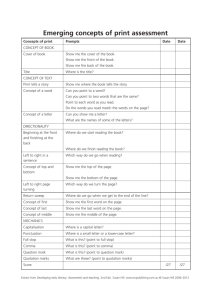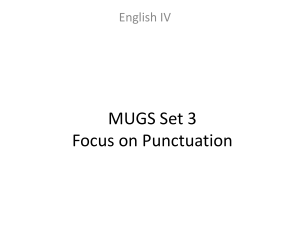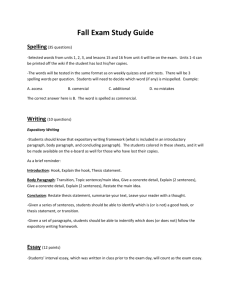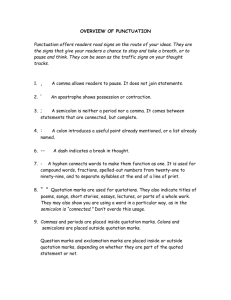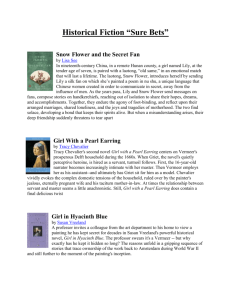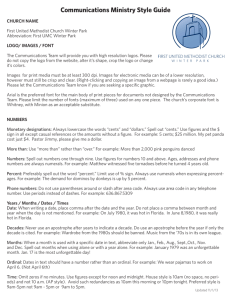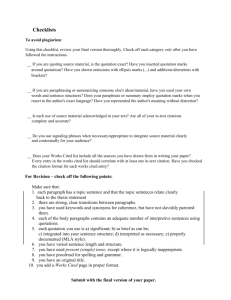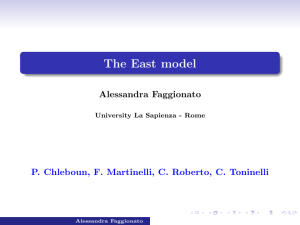Spring Exam Study Guide Spelling
advertisement
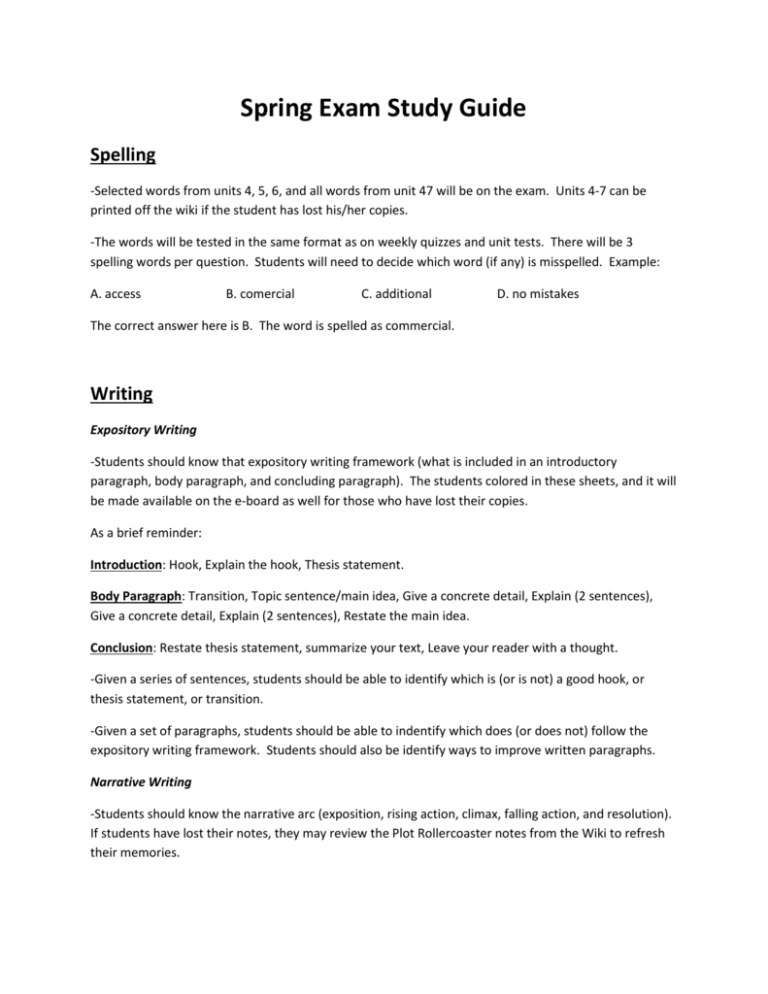
Spring Exam Study Guide Spelling -Selected words from units 4, 5, 6, and all words from unit 47 will be on the exam. Units 4-7 can be printed off the wiki if the student has lost his/her copies. -The words will be tested in the same format as on weekly quizzes and unit tests. There will be 3 spelling words per question. Students will need to decide which word (if any) is misspelled. Example: A. access B. comercial C. additional D. no mistakes The correct answer here is B. The word is spelled as commercial. Writing Expository Writing -Students should know that expository writing framework (what is included in an introductory paragraph, body paragraph, and concluding paragraph). The students colored in these sheets, and it will be made available on the e-board as well for those who have lost their copies. As a brief reminder: Introduction: Hook, Explain the hook, Thesis statement. Body Paragraph: Transition, Topic sentence/main idea, Give a concrete detail, Explain (2 sentences), Give a concrete detail, Explain (2 sentences), Restate the main idea. Conclusion: Restate thesis statement, summarize your text, Leave your reader with a thought. -Given a series of sentences, students should be able to identify which is (or is not) a good hook, or thesis statement, or transition. -Given a set of paragraphs, students should be able to indentify which does (or does not) follow the expository writing framework. Students should also be identify ways to improve written paragraphs. Narrative Writing -Students should know the narrative arc (exposition, rising action, climax, falling action, and resolution). If students have lost their notes, they may review the Plot Rollercoaster notes from the Wiki to refresh their memories. -Given a passage, students should be able to identify which parts of the arc are present or absent. They should also be assess the characters and setting to determine what would be a logical next step in a narrative. Proofreading: An old quiz is included to show the format of the proofreading section. Adverbs/Adjectives -Many adverbs end in –ly. They are used to describe adjectives or verbs (how something is done). I did badly on the test (describing how one did). -Adjectives describe a person, place, or thing. That is a bad test (describing the test). -Good vs. well. Good is an adjective, describing people, places, or things. Ex. That is a good essay. Well is an adverb, describing how something is done. Ex. He wrote about his experiences well. Apostrophes -Used for contractions (she’s pretty for she is pretty) -Used to show possession (the girl’s barrette…for the barrette belonging to the girl or the girls’ barrettes, for barrettes belonging to more than one girl) Capitalization -first word in a sentence should be capitalized -titles should be capitalized (Ms., Dr., Governor Jindal.) -proper nouns should be capitalized (people’s names, languages, names of schools, etc.) Commas -city, state -2 adjectives in a row that are not colors or numbers (the sweet, pretty girl) -when there is a list of 3 or more items (I have dogs, cats, and fish at home.) -after an introductory word (Yes, I would love to go to the dance with you.) -when directly addressing someone. Exs. Clara, please bring me the doll. Have you done your homework, Paul? -after an interrupter. Ex. The children, of course, laughed at the clown. -around an appositive (extra, unnecessary information about a noun). Ex. Mr. Bennett, the principal of Riverdale Middle School, is a tall man. A comma is not needed with an appositive if the information is necessary to make sense. Ex. Ms. McCarver gave the pen to her colleague Ms. Richert. (Because Ms. McCarver has many colleagues, we need to specify that it was Ms. Richert and not someone else.) -after a dependent clause that begins a sentence. Ex. If you go to the store, please buy me some candy. -When there are two prepositional phrases at the beginning of a sentence. Ex. At the edge of the campus, students looked at their school building. -each line of a poem should be capitalized -around “too” if it means also. Ex. I’d like to go, too. -See also quotations. Colon -Use a colon before starting a list. Ex. Ms. McCarver reminded the class of what was to go in their notes: date, lesson title, objectives, definitions, and examples. Conjunctions -Coordinating conjunctions (FANBOYS…for, and, nor, but, or, yet, so) almost never have a comma in front of them UNLESS: They’re in a list of 3 or more items. They’re combining 2 or more independent clauses (i.e. fixing a run-on, or clauses that could each be a sentence on its own) Avoid starting a sentence with a FANBOY. -Subordinating conjunctions (A WHITE BUS…after, although, as, when while, where, how, if, than, even though, because, before, until, unless, since, so that) Almost never have a comma in front of them. When combined with a subject and a verb it will usually require a comma at the end of the phrase. Ex: Unless you study for your exam, you may not do as well as you would like. Dash -A dash can be used to show a break or a shift in thought or structure. It also can signal an afterthought. It can sometimes be used in place of commas around an interrupter (break). Examples: I found her most — well, I didn’t like her manner. (shift in structure) The big Doberman — the one with the floppy ears —leans against walls and people. (break) My floppy-eared Doberman often leans — you know, all Dobermans lean like that. (shift in thought) Homophones and other easily mistaken words there/their/they’re knew/new hair/hare to/too/two quiet/quite aisle/isle principal/principle die/dye you’re/your whose/who’s right/rite/write breath/breathe heard/herd its/it’s one/won by/bye no/know then/than accept/except further/farther our/are sea/see quit/quiet/quite lie/lay fair/fare past/passed counsel/council presence/presents fewer/less rise/raise peace/piece wrote/rote wear/ware week/weak loose/lose sit/set Hyphens -When two words are being used as one concept (i.e. eighth-graders, brown-faced) Other -Exclamation marks are used for emphasis or strong feeling. Ex. I can’t believe he just did that! -Question marks are used at the end of a question. Ex. Where should we go from here? -When words from a foreign language are being used in an English text, they are put in italics. Ex. Sam whispered sotto voce to his friend. -A story/text should only be written in one tense. If everything is in the past tense, it remains in the past tense. If everything is in the present tense, it remains in the present tense. The only exception is if something is being said out loud and is in quotation marks. -If a word starts with a vowel, it is preceded by “an.” If it starts with a consonant, “a” is used. Exs. An apple, a car -Write out words smaller than twenty (three rather than 3). -Between vs. among. Between is used for two things, while among is used for three or more things. Ex. I’m trying to choose between plain and peanut M&Ms. Or You can choose from among the following choices: M&Ms, Snickers, or Milky Ways. -Who vs. whom. Who is the subject of a sentence, whereas whom is the object of the sentence. If you one would answer the question Who did this? If it is him/them, then “whom” should be used. If it is he/they, then “who” should be used. -Who vs. that. Who is used to describe a person. That is used to describe a thing. Ex. Felicia, the girl who dyed her hair, is not in a good mood. Ex. Bring me the pencil that fell on the floor. -Affect vs. effect. Affect is a verb, which means that something is being influenced. The teachers were affected by the students’ good moods and gave everyone an “A.” Effect is a noun. It is the result of a cause, or something that happened. The child’s studying had the effect of helping him to get a good grade on the test. -Subject/pronoun agreement. If a subject is singular, then its pronoun should be singular. If a subject is plural, then its pronoun should be plural. Ex. Each of them found his or her name on the list. (Not, each of them found their name on the list, as each is singular) Ex. They found their names on the list. -Subject/verb agreement. If a subject is singular, then its verb should be singular. If a subject is plural, then its verb should be plural. Pay particular attention to collective & indefinite pronouns. Ex. Each of the girls wants to date the quarterback. Ex. All of the girls want to be on the cheerleading squad. Singular indefinite pronouns another, anybody, anyone, anything, each, either, everybody, everyone, everything, neither, nobody, no one, one, somebody, someone, something Plural indefinite pronouns both, few, many, several Singular or plural indefinite pronouns (depending on context) all, any, most, none, some -Avoid ending a sentence with a preposition. Ex. From where did he come? Not, where did he come from? -When a double negative is used, it means something positive. Ex. You don’t have any class vs You don’t got no class. -Can use a semi-colon to separate a series of independent clauses. Ex. “That’s nice,” said Ms. Amicable artist, but her eyes never fluttered; her tongue never protruded; and her ears and nose never emitted smoke. Paragraphs -Start a new paragraph when there is a: New topic New speaker Time change New scene/location Quotations -Used for what is being said out loud. -If a quotation starts in the middle of a sentence, it is preceded by a comma (which does not go inside the quotation marks. Ex. He said, “Let’s go to the beach!” -At the end of a quotation, commas and ending punctuation marks (!.?) always go inside quotes. Ex. “Please bring me the stapler,” requested the teacher. “I don’t want to grow up!” yelled the toddler. -When a new person starts talking, a new paragraph is started. -When a word or phrase is made up, quotation marks go around it. Ex. She muttered a “cheer-up spell” to make her friend happier. -If there is a quote within a quote, single quotation marks are used. Ex. The teacher said, “I’ve told you a million times. William Shakespeare wrote, ‘To be or not to be, that is the question.’ Now will you remember?” -Use quotation marks around a letter. Ex. Carol made straight “As” on her report card. -Use quotation marks around the name of a special event. Ex. Beth Bibliophilic won the “Million Minutes of Reading” contest. -If a quote goes on for multiple paragraphs, there is no end punctuation mark at the end of the paragraph. Instead, there is just an opening quotation mark at the beginning of the next paragraph. Ex. “I was in your science class…………………………………………………………………………………………………………………………They used to lie in wait for me between classes. “Orson always whispered malevolent things…. -If there is a double meaning to a word, and the author is trying to make a pun/double entendre, put the word in quotation marks. Ex. Sam was struck “dumb” by the girl. -If a word is made-up, of part of the vernacular (slang), put quotation marks around it. Ex. She is “phat,” pretty hot and tempting. Run-ons -A run-on is when two or more independent clauses are joined together improperly (i.e. when a sentence could be broken into 2 or more sentences). Ex. I lost my homework, I’m afraid I will fail my class. A run-on can be fixed in one of three ways: 1) Turn it into 2 separate sentences. Ex. I lost my homework. I’m afraid I will fail my class. 2) Combine it with a comma AND a conjunction (like and, but, or). Ex. I lost my homework, and I’m afraid I will fail my class. (If only a comma is used to separate two independent clauses, it is STILL considered a run-on.) 3) Combine it with a semi-colon. Ex. I lost my homework; I’m afraid I will fail my class. Spelling errors (common) friend weird a lot (not alot) no one (not noone) -If a word ends in a consonant + “y” then drop the “y” and add “ies.” Ex. Parties rather than partys -If a word ends with a consonant-vowel-consonant, double the last consonant when adding a suffix. Ex. Grab => grabbing Titles -Titles of short works (articles, short stories, songs, poems, artwork) are placed in quotation marks. -Titles of longer works (novels, books, movies, plays) are italicized or underlined. 7th Grade Proofreading Quiz CY#58-59 Directions: Do not write on this paper. Instead, record your answers on a separate sheet of looseleaf. Select the line that contains an error. Remember, all of these passages come from the same story. If there are no errors, select D, “No mistakes.” (1 pt. each) 1. A. “Wowzer man,” whispered Jesse B. to his friend Sam, who also had witnessed C. the effect of william’s poem on the teacher. D. No mistakes. 3. A. I can’t wait to regale the rest B. of our friends with this latest C. affect of William’s poems.” D. No mistakes. 2. A. “This B. rock’s.” C. No mistakes. 4. A. Yes this was another B. piece to add to the puzzle C. of the bizarre teachers. D. No mistakes. 5. A. Inspired by William’s success and by B. Ms. Witty Writing Wizard’s fervent C. teaching, Jesse wrote a cinquain of his own. D. No mistakes. The passage below is not from a quiz, but it a series of Caught’Yas (daily edits) that each student can use to practice. Hint: There are seven paragraphs. All periods are correct. Do not change any of them. Twice, the first quotation mark has been left in to help you. There are spelling errors and one missing hyphen. Some words will need to be changed. out of the corner of his eye william spied mr math martinet that was standing at the front of the classroom. as william uttered the last few words of the poem mr martinets eyes fluttered less than 8 times his tongue would protrude and his ears exuded curls of smoke. “aha muttered William to no one in particular cinquains work as good as limericks on these bizarre teachers. sam sagacious pursued his new interest the girl in homeroom whose name was alessandra amorous. she was a former sycophant of orson odious. alessandra had become disenchanted with the latter when orson who secretly loved alessandra had poped her bra in the back right in front of everyone in the lunchroom. she hadnt spoken too orson since then. orson odious of course was not pleased with this turn of events and he went out of his way to embarrass alessandra every chance he got. alessandra also avoided danny dapper and petra pulchritudinous whom still hung with there leader orson. “still stuck up arent you alessandra orson asked alessandra one day in front of sam and at least 9 other students as he past by. yes are you spurning me too queried petra spitefully. Petra secretly missed the company of her former freind alessandra when she primped in the girls bathroom among every class but she would never let orson danny or alessandra know. alessandra muttered something uncomplimentary in spanish under her breath but no one else heard the affront. orson certainly wouldnt have understood it anyway. Answers/Corrected version (Do not read this page until you have done the work on the preceding page. It is for your own benefit to see what you know, before you start to find out the answers.) 1. 2. 3. 4. 5. C (capitalize William) B (rocks are not possessing anything, nor is it a contraction for rock is) C (it should be effect, not affect) A (there should be a comma behind yes, as it is an introductory element) D Out of the corner of his eye, William spied Mr. Math Martinet who was standing at the front of the classroom. As William uttered the last few words of the poem, Mr. Martinet’s eyes fluttered fewerthan eight times, his tongue protruded, and his ears exuded curls of smoke. “Aha,” muttered William to no one in particular, “cinquains work as well as limericks on these bizarre teachers.” Sam Sagacious pursued his new interest, the girl in homeroom whose name was Alessandra Amorous. She was a former sycophant of Orson Odious. Alessandra had become disenchanted with the latter when Orson (who secretly loved Alessandra) had popped her bra in the back, right in front of everyone in the lunchroom. She hadn’t spoken to Orson since then. Orson Odious, of course, was not pleased with this turn of events, and he went out of his way to embarrass Alessandra every chance he got. Alessandra also avoided Danny Dapper and Petra Pulchritudinous who still hung with their leader, Orson. “Still stuck-up, aren’t you, Alessandra?” Orson said to Alessandra one day in front of Sam and at least nine other students as he passed by. “Yes, are you spurning me, too?” queried Petra spitefully. Petra secretly missed the company of her former friend, Alessandra, when she primped in the girls’ bathroom between every class, but she would never let Orson, Danny, or Alessandra know. Alessandra muttered something uncomplimentary in Spanish under her breath, but no one else heard the affront. Orson certainly wouldn’t have understood it anyway.
